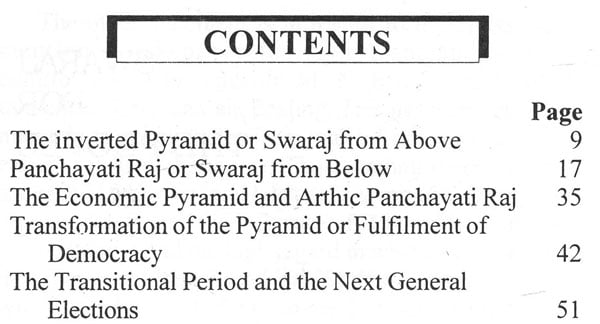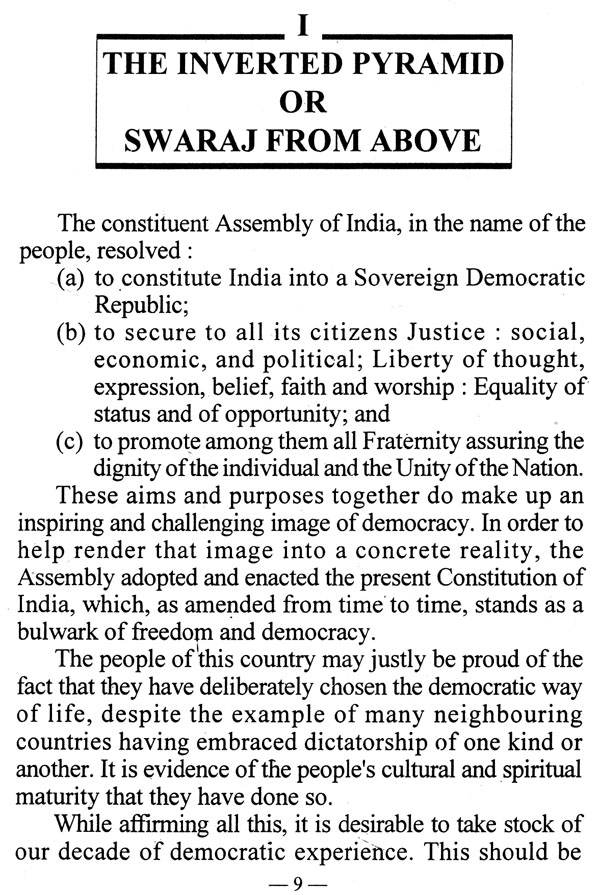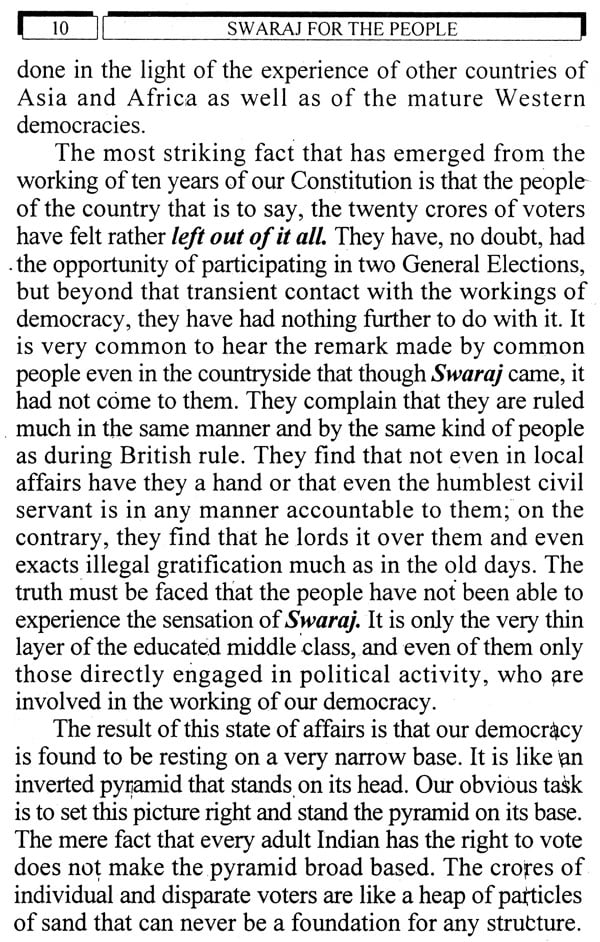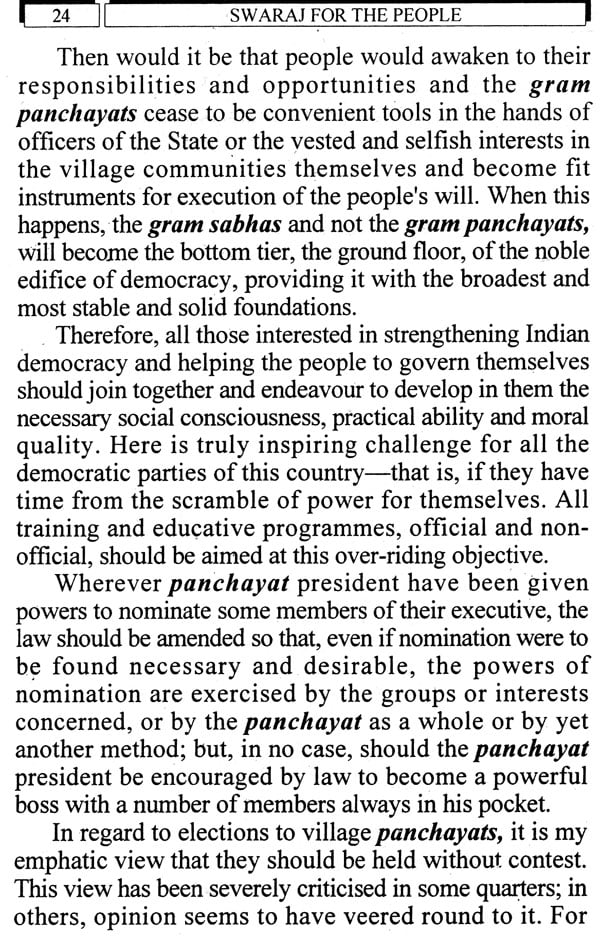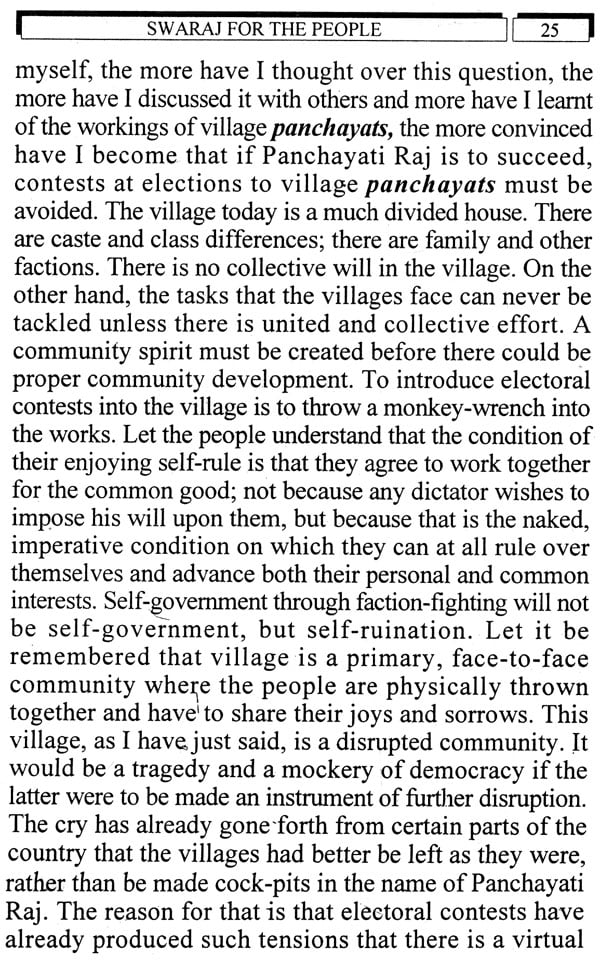
Swaraj for the People
Book Specification
| Item Code: | NAV237 |
| Author: | Jayaprakash Narayan |
| Publisher: | Sarva Seva Sangh Prakashan, Varanasi |
| Language: | English |
| Edition: | 2013 |
| Pages: | 56 |
| Cover: | PAPERBACK |
| Other Details | 7.00 X 5.00 inch |
| Weight | 40 gm |
Book Description
Some time ago I had circulated privately a paper on what I had termed 'Reconstruction of Indian Polity'. A number of seminars and group discussions have been held since, in this country and abroad, and many kind friends, Indian and foreign, have sent me their suggestions and criticisms. Some of these have appeared in the 'Bhoodan' Weekly. Even though the paper had not been made public, fragmentary reports have appeared in the press along with comments. The seminars and private criticisms have been of the greatest value to me and a sizeable volume of material has accumulated that will take time to digest properly. I might say that while I have not yet found any reason to change the essential points of my thesis, my ideas have changed on several other matters and I have come to realise that the manner of presentation must also be radically altered. It has also been made clear to me that I had tried, rather unwisely, to cover within a very short space too wide a' ground which has naturally led to unnecessary misunderstanding. In view of the pressing and large demand upon my time on account of active involvement in a mass movement to which I cannot but give first priority, it is difficult to say when it would be possible to re-write and publish my paper. But, as my interest in the question was never academic or scholastic, and also because I consider it to be a matter that should receive urgent public attention, I am venturing to set forth below my arguments and proposal regarding the central question raised in the original paper, namely, that of reform and reconstruction of the political institutions and processes of this country so as to make them more democratic, efficient, enduring and meaningful. The philosophical, sociological and economic aspects of the question I shall leave aside for the present, referring to those only when unavoidable. Let me, however, emphasize that the political structure of the country/must of necessity be linked intimately with the whole structure of society and the mode of life and thought to its people. Before I turn to the subject I should like to make two brief statements. The first of these is in regard to one class of my critics. The central point of this kind of criticism is that I am an enemy of democracy and my real aim is to undermine Indian democracy while pretending to be anxious to broaden and deepen it. I really do not know how to deal with criticism that starts with questioning motives and imputing dishonesty. Nevertheless, I should like to take this opportunity—lest there should any misunderstanding on that score—to affirm my undying, unchanging faith ip human freedom and the democratic way of life. I hold as fast even now to the following words—and shall always hold fast to them—as when I uttered them a few years ago : 'Freedom had become a passion of life and I shall not see it compromised for bread, for power, for security, for prosperity, for the glory of the State or for anything else.' (From : Socialism To Sarvodaya). The other statement is in regard to my omission to mention in my paper the significant and seminal contribution of the late Mr. M. N. Roy to the body of thought with which I am dealing. This has been seriously misunderstood in circles from which I had every right to expect substantial support. Those among them who are acquainted with me—and I do count several friends in those circles—know well the influence of Roy on the evolution of my thought and the high regard in which I have always held him even I have found it difficult sometimes to agree with him. I believe there is no need for me to add that at no time have I claimed to have made an original contribution to political thought. I am indebted not only to Roy, but to many others—most of all to Gandhiji. At the same time I must also make it clear that no one else but myself should be held responsible for the ideas I had expressed in my original paper or am about to do now.
**Contents and Sample Pages**
